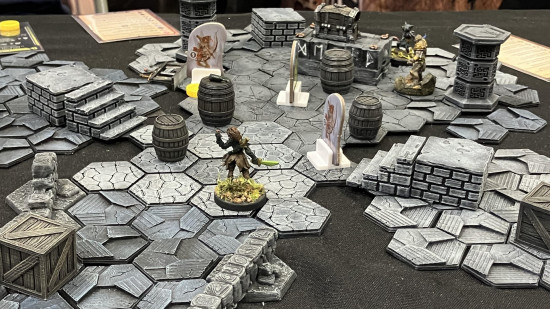According to its lead designer, Danielle Lauzon, the Gloomhaven RPG takes the ethos of the board game, in which your attacks can’t miss, and converts it into a fail-forward system, where actions never outright fizzle, but often have unintended consequences.
“In the board game, when you swing on somebody, you may fail to do damage, but you don’t ever miss. And we bring that into all the other aspects of the game,” Lauzon says, when we catch up with her at Cephalofair’s stand at UKGE.
“You may fail to get your desired goal, but you never fail to do the thing you’re trying to.” She adds that combat works very similarly to base Gloomhaven as well.
But all this doesn’t mean the Gloomhaven RPG is devoid of challenge – a bad result can still result in disastrous outcomes. The idea is that actions in the tabletop RPG should have a consequence, even if it’s a bad one. “Success or fail, there is a story result,” says Lauzon.
She gives the example of an elementalist trying to freeze a guard into a block of ice. “Say I fail the check. Okay, they become a block of ice, but now you’ve maybe attracted an ice elemental – and now you have to deal with this ice demon that showed up.”
The designer explains that the RPG contains a lot of advice for how to drive the story forward when players attempt an action, to support the GM.
According to Lauzon, one reason the Gloomhaven RPG came about is that “a lot of people have expressed a desire to keep their characters and keep playing the Gloomhaven game after the board game has finished.”
“Instead of making box after box of giant board game, it’s easier to create an RPG book, and then people can make their own scenarios.”
To support this vision, the RPG has a lot of features that will be instantly recognisable to Gloomhaven devotees. For instance, just as the strategy board game provides battle goals that encourage unpredictable moves, in the Gloomhaven RPG each player has a faction, which will give them alternate goals to follow – and these could seem mutually exclusive at first, unless the opposing players can find a compromise.
“It’s important that the players talk to each other,” Lauzon says, explaining that Cephalofair doesn’t recommend running these goals as ‘secret’, unless your group particularly wants to.
If you’ve been following our coverage of this game up to now, you’ll already know that the tabletop RPG uses cards instead of dice, and be familiar with the basics of character creation. Lauzon reveals that the RPG actually encourages players to make multiple characters, and decide which they want to send on each mission.
She says one big selling point for the game will be the iconic Gloomhaven setting. “It’s got a very strong setting. The world around you is kind of shitty… and Gloomhaven is this one small haven.” Lauzon says. “But there are points of light, and humor, and weird silliness.”
For more great content, check out our Gloomhaven review (spoilers, we think it’s bloody good.) Or find out if you can play the new mini version of Gloomhaven on a moving train.
Source: Wargamer




